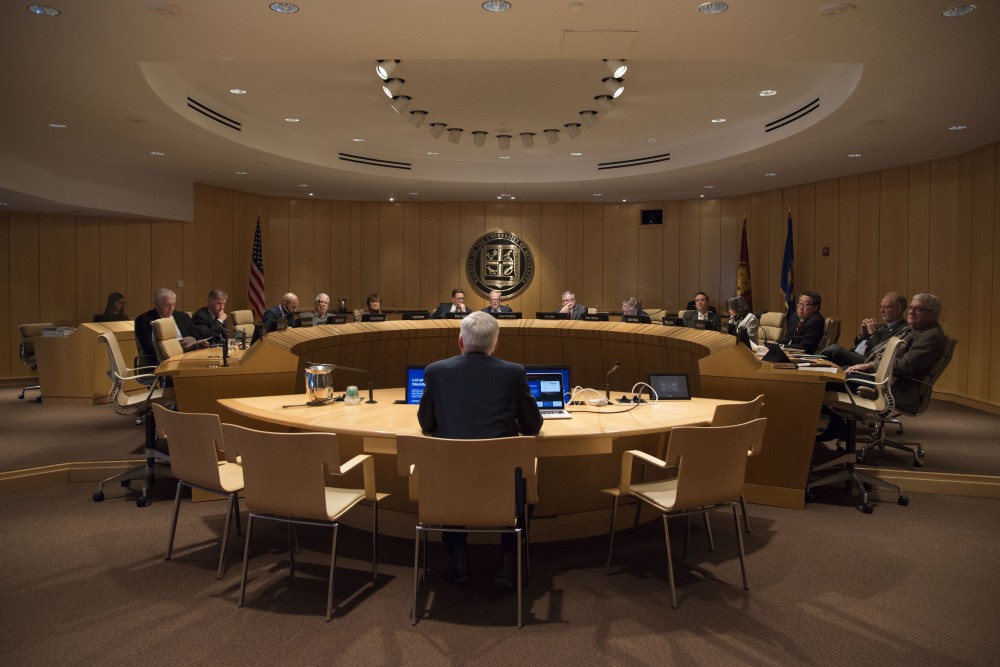The University of Minnesota’s Board of Regents reviewed recommendations from student representatives and discussed system campus’ enrollment plans at a meeting Friday.
Report from student representatives
Student representatives to the regents presented their annual report to the board, which focused on sustainability, mental health and campus climate.
“While each campus is unique without a doubt, we offer a glimpse into topics and issues that are present on all campuses,” said University of Minnesota Duluth senior Alexandra Ulland, vice chair of the student representatives to the board.
The report recommended increasing collaboration across the University’s five campuses, including reinstating a systemwide strategic sustainability committee, as well as adopting a systemwide task force and providing a biennial student survey on campus climate issues.
However, mental health quickly emerged as the predominant concern for regents.
Student representative chair Marta Dean said mental health remains a perennial issue for students, highlighting the rising number of students with a mental health condition, according to recent Boynton Health surveys.
“We recognize this is not the first time we have brought this issue forward and it will likely not be the last,” said Dean, a University of Minnesota-Crookston senior. “There is still more that can be done to address mental health on campus.”
The student representatives’ report recommended a “comprehensive systemwide action plan” based on a new external review of the University’s approach to mental health, as well as reviewing mental health services every five years.
With the demand for mental health services outpacing the University’s capacity, President Eric Kaler said the University may have to look to private health insurance and other forms of support.
“I do think we have been effective in addressing the needs, but I appreciate you noting that the demands are ever-increasing,” he said. “Pragmatically, at some point we can’t provide all that’s needed for that population.”
Though he recognized the ongoing need to address mental health concerns, Kaler said he was “neutral to negative” on an external review of the University’s practices.
Regent Dean Johnson said he often hears mental health is an issue for young people, but wants to understand the underlying causes.
“Where has it risen to this level? I agree we need to deal with it, but I’m trying to figure out the symptoms,” Johnson said.
Regent Darrin Rosha said today’s students face additional challenges than previous generations.
“I don’t envy students today … the expectations of your generation are greater,” he said. “I think this is going to be one of the great issues we’re going to have to deal with.”
Some regents were concerned that there is no mental health office on the West Bank, including Regent Peggy Lucas.
“I know we can do better,” she said.
Campus enrollment plans
The board also discussed five-year enrollment plans on the Crookston, Morris, Duluth and Rochester campuses, part of ongoing planning efforts across the University campuses.
“Systemwide campus enrollment planning is intended to improve cross-collaboration when possible and appropriate and complement individual planning on each campus,” said acting Provost Robert McMaster.
The Crookston campus will start a test-optional admissions process next academic year, allowing students to submit applications without ACT test scores. Instead, the school will look at holistic reviews for prospective students.
“I want to ensure you we have taken a thorough, critical and in-depth look at our admissions process,” said Crookston Chancellor Mary Holz-Clause. “We are taking this step because we are fully convinced it will help to raise the bar at what really matters in selecting students who will be successful.”
School officials say standardized test scores have not significantly helped predict students’ success. Although the applications won’t require test scores, many applicants still end up submitting an ACT score. Only around one-fourth of students applying choose not to submit test scores, a population concentrated among students of color, low-income and first-generation college students, according to a report by the National Association for College Admission Counseling.
School officials say the new admissions practices will help fuel a modest undergraduate growth of around 2 to 5 percent in each of the following four years, changing course from a 2.2 percent average annual decrease over the past decade.
Regent Michael Hsu praised the adoption of a test-optional admissions process, which he said will mean more revenue from applications.
“I would like to congratulate [Chancellor Holz-Clause] for being courageous and bold in this area. And I hope that other campuses look at this,” he said.
At Duluth, school officials are aiming to stabilize undergraduate enrollment, with increment growth of around 300 students by 2023. However, the school will have to expand on-campus housing and certain programs to meet increasing demand.
The Morris campus is also planning for incremental undergraduate growth with a target of 1,700 degree-seeking undergraduates by fall 2024. Morris currently enrolls around 1,500 students.
Officials at the Rochester campus, the smallest campus of the University system, are planning for 50 additional undergraduate students each year, reaching 700 undergraduates by 2021.
“Each of the University’s five campuses, they have distinct enrollment strategies and goals,” Kaler said. “At the same time, they have shared objectives: to attract the best and the brightest; to maintain access and affordability; to support diversity and maintaining a uniformly high quality experience.”
Regent Darrin Rosha said the University needs to provide the necessary resources for its system campuses, especially for facilities.
“Who you admit, how many you admit [and] for what you are admitting will dictate who you are,” Rosha said. “The impact you have in your region and your community is really profound.”
The board will vote on enrollment plans during a meeting later this spring.








